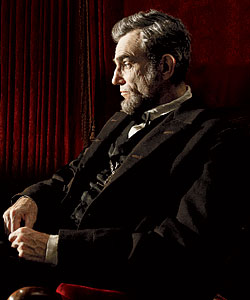
When the trailer for Steven Spielberg’s much-anticipated historical drama Lincoln debuted in September, critics around the world immediately zeroed in on the voice (was it really that high-pitched?) and the cast (Sally Field as Mary Todd?) and a question: What is going on with this movie?
The film, in theatres November 9, explores the last four months of the 16th president’s life. That’s when Lincoln (Daniel Day-Lewis) was working to secure his most enduring achievements: the Union’s victory in the Civil War and the ratification of the 13th Amendment, which officially ended slavery. You won’t see the bloody Battle of Antietam or the issuing of the Emancipation Proclamation (though the Gettysburg Address does kick off the trailer). In their place are quieter moments: the First Lady observing a fighting Congress, the chief executive debating with his staff about freeing slaves and, above all, pondering how to handle the troubles of his time. “It was important for me to get a penetrating and thorough look at Lincoln as a man, as a working president, not as a posing president,” Spielberg has said.
Just as important was getting Lincoln exactly right. The screenplay is based on historian Doris Kearns Goodwin’s best-selling Team of Rivals and adapted by Tony Kushner, the playwright behind Angels in America. But even historians can disagree. “They vigorously debate the nature of Lincoln’s leadership—whether he was primarily reactive and pragmatic or proactive and ideological,” says Bryon Andreasen of the Abraham Lincoln Presidential Library and Museum in Springfield. “No matter how Tony Kushner interprets Lincoln, there will be critics contending he got it wrong.”
When it comes to the look and feel of the movie, Kushner and Spielberg are on solid ground. They convened a panel of 20 Lincoln experts before setting to work on the final script and followed up with them throughout filming. “In production, the prop people would call us with questions,” says Andreasen. “They actually came and recorded the sounds of our artifacts—a dinner bell from the White House, the clock from Lincoln’s law office, and Mary’s music box.”
And you can be sure that Day-Lewis, who is famous for his meticulous preparation for roles—he learned to skin animals before appearing in 1992’s The Last of the Mohicans and apprenticed as a butcher for 2002’s Gangs of New York—has nailed the speaking voice of Illinois’s most famous son. It’s not exactly presidential. “From all accounts, Lincoln had a high, nasal, twangy voice,” Andreasen says. “It’s not what people normally think.”
Photograph: Courtesy of Dreamworks II Distribution Co., LLC.


